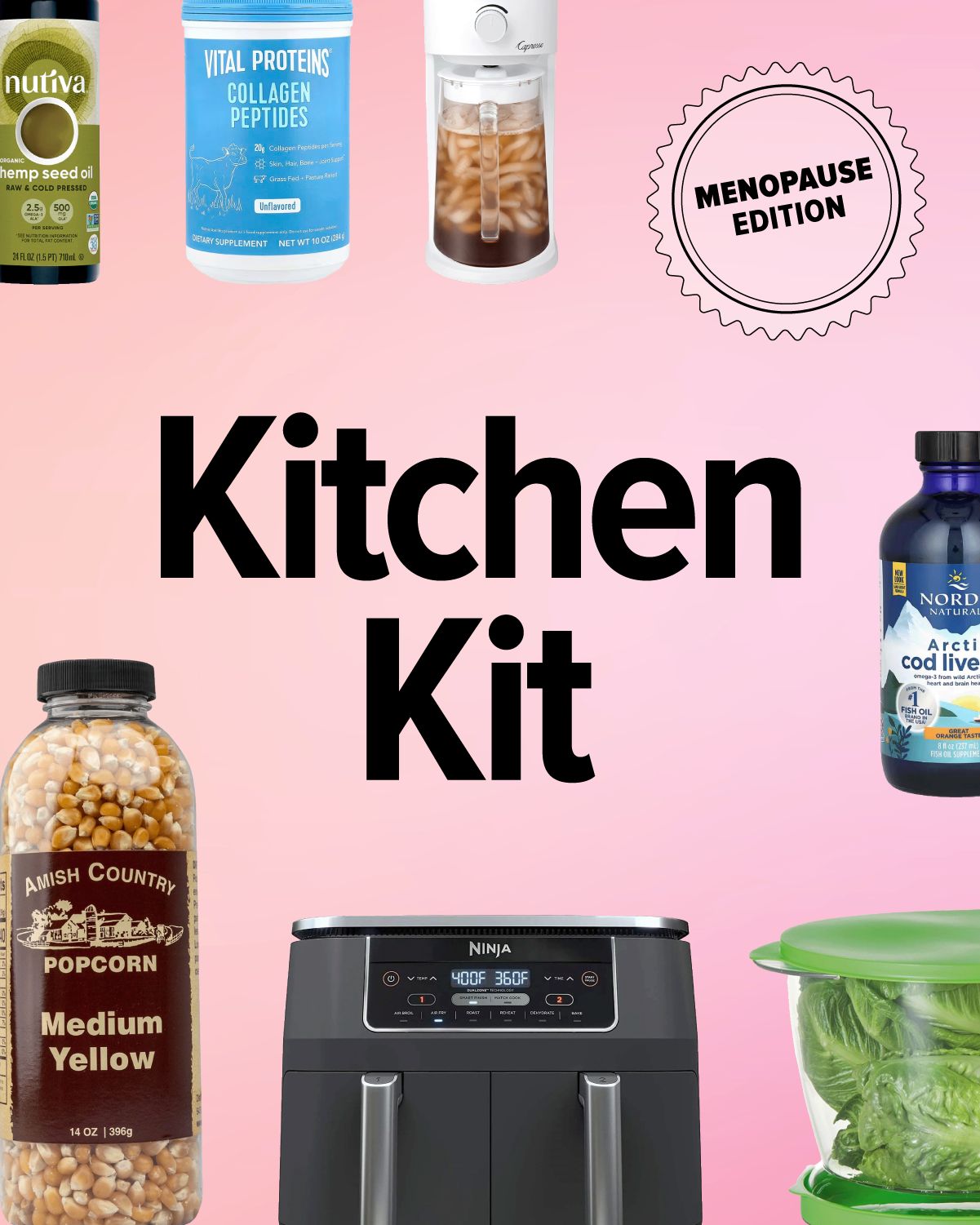Diet is one of the most powerful levers you can pull to manage menopause symptoms. Here’s how to stock your kitchen for success.
It’s easy to read recommendations about how to eat for menopause symptoms, but it’s sometimes harder to put them into practice when you have a trillion other things to focus on.
Change is hard. Your favorite meals, recipes, and your cooking habits are not immune.
Jerlyn Jones, a registered dietitian who focuses on female health, explained why certain nutrients are helpful for menopause and where to focus your energy in the kitchen.
“Dietary patterns directly affect and benefit common symptoms,” she says.
To help make a menopause diet easier, we’ve recommended some tools and snacks to help you stock up for the journey.
Jerlyn Jones, MS MPA RDN LD CLT

Jerlyn Jones is a registered dietitian nutritionist and owner of The Lifestyle Dietitian LLC, an Atlanta-based nutrition consulting practice.
Her specialty is integrative nutrition with an emphasis on food sensitivities, digestive problems, and female health.
You may have been told to eat more fish. Do it for heart health, they say. Do it for hot flash defense, they say.
Jones explains that omega-3s can especially improve sleep quality by helping regulate serotonin, a precursor to the natural sleep aid melatonin.
But if you’re not big on seafood, you’re probably rolling your eyes right now. Like it or not, a lack of omega-3s stands in the way of good health before, during, and after menopause.
Why omega-3s matter for menopause
Menopause equals reduced estrogen, which makes it harder for your body to metabolize fats well. Omega-3 fatty acids can help this process.
A 2020 review found that supplementation with omega-3s (as well as vitamins A, C, and E) for menopausal women was associated with lower levels of certain lipids that increase oxidative stress and, therefore, risk of heart disease and diabetes.
A
Hacks for eating more omega-3s
- An air fryer is a must for cooking salmon and other fish to the perfect texture.
- Flaxseeds, chia seeds, walnuts, soybeans, and hemp seeds are also high in omega-3s. Add soaked chia seeds or ground flaxseeds to smoothies or other nuts and seeds to salads.
- Replace olive oil with hemp seed oil in your salad dressings, but avoid cooking with it, as its smoke point is low.
- If you still cannot eat enough omega-3s through food, consider a supplement. Nordic Naturals Cod Liver Oil sounds foul, but the orange flavor proved to be tasty and much easier to take than large fish oil capsules.
Shopping list
Females in menopause need around 1 to 2 grams (g) of protein per kilogram of body weight. Say you weigh 170 pounds, that’s 77 kilograms, and the recommended dietary allowance (RDA) is 77 to 154 g of protein per day.
What could that look like on a plate? An example of a day’s worth of meals courtesy of Jones:
- Breakfast: Tofu scramble made with 3 ounces of tofu, 1 cup of red kidney beans, and mixed vegetables — served with 1 cup of halved strawberries and a half cup of soy milk (28.7 grams of protein)
- Lunch: 1 cup of quinoa, 3 ounces of grilled salmon, and 1 cup of sautéed spinach (36 grams of protein)
- Dinner: 3 ounces of grilled chicken, 1 cup of brown rice, and 1 cup of broccoli (35.7 grams of protein)
- Total protein: 100.4 grams
Why protein matters for menopause
Declining estrogen levels strike again when it comes to healthy bones and muscles, both of which can lose density and strength during menopause.
Additionally, metabolism tends to slow down as you age in general, but particularly during menopause (you guessed it — low estrogen is still to blame). This can make weight gain and weight management a prime focus for individuals at this stage.
Protein can help on all these fronts by increasing feelings of fullness and supporting hormones involved with appetite. It helps with muscle mass, particularly when paired with exercise. Meanwhile, the collagen in protein promotes good bone density.
Hacks for increasing protein
- Blend a container of cottage cheese using a small blender or hand immersion blender. This emulsifies it and makes a great base for sauces at dinnertime. High protein mac and cheese, yes, please.
- Drink a smoothie along with your lunch, complete with yogurt and a scoop of protein powder.
- Snack on cheese instead of chips. Mozzarella, parmesan, and Swiss cheeses have higher protein content than others.
Shopping list
Swapping white rice for brown rice is not groundbreaking news (wild rice is good, too). But there are a number of other whole grains you can try for variety. Let’s face it, it’s the spice of life.
Think: oats, quinoa, millet (great in salads), barley, whole rye bread, and buckwheat.
Why grains matter for menopause
Whole grains are a good source of B vitamins and fiber.
“Aiming for 35-40 grams of fiber a day, mainly with whole grains, is associated with weight loss, a lower risk of coronary artery disease, and cardiovascular disease,” says Jones.
These are all risks that increase with menopause.
In addition to lowering disease risk in the long term, they may also help decrease menopause symptoms in the short term. A 2020 review of existing research found that women who ate more whole grains, vegetables, and unprocessed foods experienced less intense symptoms.
Hacks for eating more whole grains
- Snack on popcorn. Opt for plain kernels and pop them old school on the stove (rather than prepackaged options with extra sodium and additives).
- Join the overnight oats trend (recipe linked below), and make them with milk. Bonus points for swapping in walnuts, which provide omega-3s. Add protein powder to make it a triple threat. You’ll want a package of Ball jars or other glass jars as a vessel to make these ahead of time for the week.
- An Instant Pot or rice cooker cooks rice only slightly quicker, but it can be more convenient because you can set it and forget it, rather than having to monitor and stir.
Shopping list
Vegetables are good for you. Are you surprised?
Knowing carrots, broccoli, and kale are healthy is one thing. Actually wanting to eat them and cooking them so that you crave them is another. Carbs, breads, and salty and sweet snacks just taste better. The challenge is getting veggies to rival that.
Why veggies matter for menopause
The earlier 2020 study, which found that whole grains decrease the intensity of menopause symptoms, also included vegetables in this list of beneficial foods.
Another
Hacks for eating more vegetables
- Give vegetables a fighting chance by making sure they stay fresh for longer. Fresh means more flavor and helps prevent food from going bad before you get to cook it.
- An air fryer can also help you nail the texture of cooking vegetables so they are crispy and delicious.
- If you’re feeling uninspired, try a meal delivery service. It can help simplify meal planning and expose you to new ingredients you don’t typically cook with.
Shopping list
Phytoestrogens, likely a less familiar nutrient, are compounds (mostly found in plants) that can positively affect estrogen levels. They include isoflavones and lignans.
“It’s not clear how someone can know if they are consuming enough phytoestrogens,” explains Jones. However, she points to one study that recommends 20 mg per day of soy isoflavones supplementation during perimenopause for symptom reduction.
Think soy products like tofu, flaxseeds (which are also great for eating more whole grains), dried fruit, berries, and garlic.
Why phytoestrogens matter
for menopause
More
Phytoestrogens are also linked to improved heart health and cholesterol levels. As a bonus,
Hacks for eating more phytoestrogens
- Drink green tea — hot or cold. Consider an iced tea maker for summertime.
- Experiment with tofu dishes. Unless you’re a plant-based eater, try incorporating tofu into your side dishes rather than replacing your meat proteins, as traditional meat still has more protein.
- Circle back to those veggies. Cruciferous vegetables like broccoli and Brussels sprouts are good sources.
Shopping list
Gut check
A balanced gut microbiome
Read more about setting up your kitchen for gut-healthy cooking.
Adding some other supplements to your regimen can help with menopause symptoms and set the ground for good health postmenopause.
We’ve already covered options for omega-3s and protein powder, but here are some others to consider and why. (Always consult your doctor or a trusted healthcare professional before starting any supplement.)





